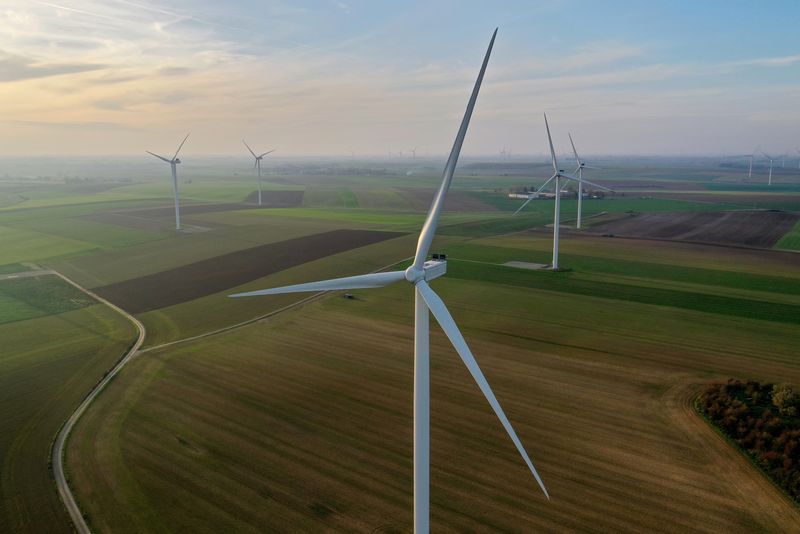By Philip Blenkinsop
BRUSSELS (Reuters) -The European Commission on Wednesday proposed allowing increased levels of state aid so that Europe can compete with the United States as a manufacturing hub for electric vehicles and other green products and reduce its dependence on China.
European Commission chief Ursula von der Leyen announced, as part of the plan, a repurposing of existing EU funds, faster approval of green projects and drives to boost skills and to seal trade agreements to secure supplies of critical raw materials.
This is partly a response to multi-billion-dollar support programmes of China and the United States, including the latter's Inflation Reduction Act.
"Major economies are rightly stepping up investment in net zero industries," von der Leyen told a news conference. "What we are looking at is that we have a global playing field."
Many EU leaders are concerned that the local content requirements of the $369 billion of green subsidies in the U.S. legislation will encourage companies to relocate, making the United States a leader in green tech at Europe's expense.
The International Energy Agency estimates the global market for mass-produced clean energy will triple to around $650 billion a year by 2030, with related manufacturing jobs more than doubling. The European Union wants a part of the action.
"We know that in the next years, the shape of the economy, the net-zero economy, and where it is located will be decided. And we want to be an important part of this net-zero industry that we need globally," von der Leyen said.
She proposed loosening state aid rules for investments in renewable energy or decarbonising industry, on a temporary basis, until end 2025, while recognising that not all EU countries will be able to offer subsidies to the same extent as France or Germany.
To try and ensure a level playing field within the EU as well, von der Leyen said member states could, for example, draw on about 250 billion euros ($272.3 billion), much of it remaining from the EU's post-pandemic recovery fund.
RESISTANCE
The European Commission is hoping member states will back its plan at a Feb.9-10 summit but it faces a hot debate.
German Economy Minister Robert Habeck, who is set to lobby Washington with French Finance Minister Bruno Le Maire next week, said he welcomed the proposals.
But some EU members have previously expressed opposition to parts of the plan, notably the loosening of state aid rules and the prospect that bigger countries such as France and Germany would be able to outspend others.
There is also clear resistance from certain EU members to previous suggestions that the plan could eventually entail further joint borrowing - which one senior EU diplomat said was "very close" to being ruled out.
Some of the initial EU reaction on Wednesday was quite negative.
The centre-right European People's Party group, of which von der Leyen's party is a member, described the plan as "too late, too little".
Solar sector industry group SolarPower Europe said it was concerned by what it called a "lack of focus" on specific technologies in the EU plan.
"Not all net-zero technologies are in the same boat – not in terms of strategic importance, or even the impact they’re feeling from the Inflation Reduction Act," said SolarPower Europe Policy Director Dries Acke.
EU FUND
Longer term, the Commission will propose creating a European Sovereignty Fund to invest in emerging technologies.
In the coming months, the Commission will propose a Net-Zero Industry Act that could streamline permitting processes and harmonise standards and a Critical Raw Materials Act to promote local extracting, processing and recycling.
The bloc is heavily reliant on China for rare earths and lithium, which are vital materials for the green transition.
The EU executive also wants to seal more free trade agreements and partnerships to make supply chains more resilient and to open markets for green goods.
Meanwhile, German chip supplier ZF Friedrichshafen and U.S. chipmaker Wolfspeed will announce plans on Wednesday to build an electric vehicle chip plant in the Saarland region, according to three sources close to the matter.

"Amid the concerns that the U.S. wants to divert investments from Europe with its Inflation Reduction Act, we're showing that a U.S. firm wants to invest in Germany," a German government source said.
($1 = 0.9180 euros)